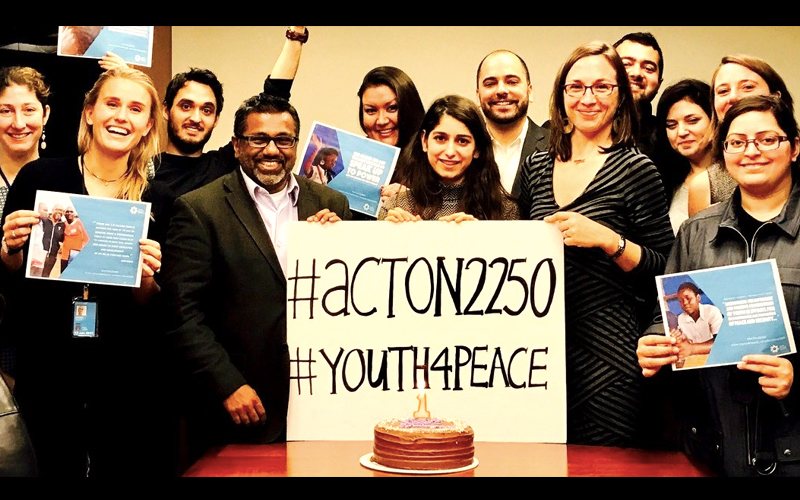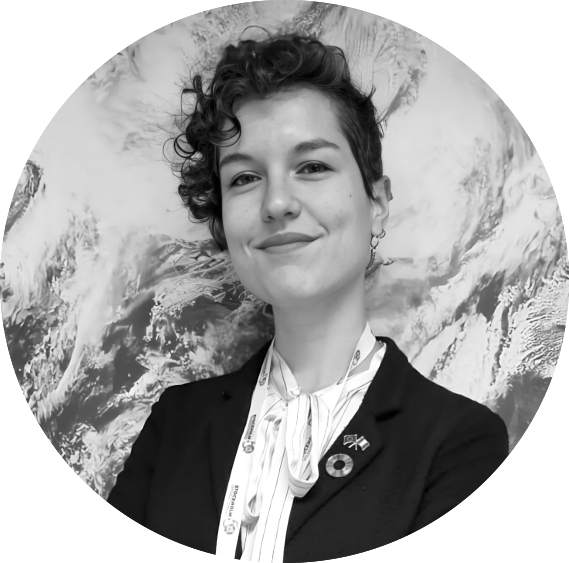
YOUTH, PEACE AND SECURITY: AN AGENDA FOR CHANGE

Today’s complex and global challenges— violent conflict, climate change, and poverty—will only be addressed over many generations. There is a growing recognition that young people will be disproportionately affected by these future challenges, if they are not already, and for this reason, they should be involved in processes to define and choose solutions. In December 2015, the UN Security Council (UNSC) adopted Resolution 2250, which recognized that young people should be engaged in decision-making at the local, national, regional, and international levels and outlined mechanisms that will enable meaningful youth participation in peace processes.
UNSCR 2250 is a landmark document, in that it establishes a global Youth, Peace and Security agenda and acknowledges that young people have the right to tackle the challenges of our time, now, as much as when they become adults. Age should no longer be a limit to participation—it should be a pre-condition.
Yet, this is not our reality. All too often, young people continue to remain far removed from the decisions that will affect their lives. Political and social systems continue to marginalize the voices of young people on account of their lack of experience. Thus, young people and youth-led organizations are seldom supported with resources or opportunities.
Read more
As the examples of Malala Yousafzai and Greta Thunberg show, young people not only have the desire to be engaged, but also have the capacity to shift debates within and across societies. These examples of young changemakers, and many more that have not yet made headlines, show the need to give more young people the space to lead and make decisions. This means including young people at the table where decisions related to peace and security are made and valuing their voices as much as those of other actors. It means that the latter has to relinquish partial control over decisions to incorporate the diverse and vital perspectives of young people.
Our organization utilizes a theory of change framework. We believe that if we create visibility for the current and potential achievements of young people to address peace and security-related issues (nationally and internationally), relevant institutions and actors will understand the value of increased youth engagement. At this point, young people will have the agency and resources to become more engaged in the peace and security decision-making processes.
AP works with NGOs and other institutions to promote a holistic understanding and participation of young people in peacebuilding and security processes. Under this initiative, AP conducts research and analysis for NGOs and other institutions, engages in advocacy and raising awareness (mainly through seminars with relevant agencies and various types of publications), and supports youth actors who are directly engaged in peacebuilding processes.

Impact
To date, AP has provided assistance to a number of institutions in order to assess and improve youth participation. Currently, we are partnering with the United States Institute of Peace (USIP) to review its youth and peacebuilding portfolio, which includes initiatives in Afghanistan, Kenya, Kyrgyzstan, Myanmar, Pakistan, South Sudan, and Tunisia. In the past, we have also completed an evaluation project of youth-focused initiatives for Search for Common Ground in the Middle East and North Africa (Lebanon and Tunisia) and Sub-Saharan Africa (Kenya, Nigeria, and Tanzania).
In March 2019, we launched an international call for articles from young researchers, activists, and practitioners working in youth-led or youth-focused organizations. We aimed to elevate both the narratives of these young changemakers and their incredible, diverse work on Youth, Peace and Security. These articles, which will be published throughout 2019, represent a vast array of youth peacebuilding experiences from all over the world.
WHERE
Global

Experts
Celina del Felice, Bernardo Monzani, Bernardo Venturi

News and Articles
“We’ve got time: Peacebuilding through the arts in Kosovo and Serbia“ Vana Filipovski (November 5, 2019)
“Digital platforms to counter violent extremism among youth: Do they work?” Saagarika Dadu and Aleksandra Lasota (October 22, 2019)
“Dialogue among youth: A means to prevent violence in Burundi” Tatien Nkeshimana (October 7, 2019)
“Talking Peace in Tehran” Yalda Khosravi (September 23, 2019)
“Youth Engagement in Nuclear Disarmament: Rethinking Peace and Security” Anna Ikeda (
“Voice without opportunity: Understanding challenges to youth participation in Tunisia“ Alissa Pavia (July 12, 2019)
“Using Positive Voices to tackle youth radicalization in Nigeria” Vivienne Bamgboye (June 28, 2019)
“From the Backyard to the United Nations: The PeaceMentors initiative in Iran” Shadi Rouhshahbaz (June 13, 2019)
“Strengthening Youth Resilience through Entrepreneurship in the Philippines“, Maria Angel Abad (May 28, 2019)
“The European Consultation on UN Resolution 2250 on Youth, Peace and Security“, Federica Sustersic (February 19, 2018)
“Building Evidence on Youth-driven Peacebuilding“, Rashmi Thapa (October 16, 2017)






























